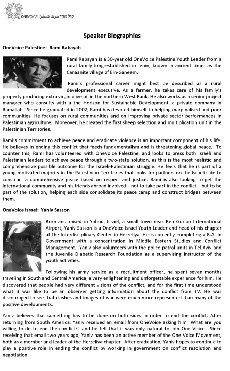Here’s a riddle for you: what do a Palestinian olive oil farmer, an Israeli university student, and an American living in New York all have in common? On the surface, it may seem like very little. But they have at least two connecting threads: all three work for the OneVoice Movement, and all three spoke in Bryan Jr. on Sept. 19.
Hillel invited these speakers as part of the semester-long “Perspectives on the Middle East” program, sponsored by the Guilford Council of Religious Organizations (GCRO.)
“(We brought them in hopes of) accomplishing our goal: unlocking doors and creating open discussion,” said sophomore Joseph Fox, co-president of Hillel.
The OneVoice Movement began in 2002 as a means of propelling world leaders to work towards a solution for the ongoing Israeli-Palestinian conflict. OneVoice’s main goal is not to propose a concrete solution, but to get the politicians in charge talking – namely, about a two-state solution.
A two-state solution means giving Palestinians their own independent state, free of any Israeli control. According to OneVoice, 76 percent of both Palestinian and Israeli citizens support that solution.
“We’re pushing leaders to understand that they have support to push towards a solution,” said Yaniv Sasson, the Israeli student who spoke at the event. “To live side by side in security – that is how we can live in peace.”
The talk began with Sasson and Rami Rabayah, the Palestinian farmer, each voicing how the conflict has affected their fellow citizens. The Palestinians, said Rabyah, no longer have their basic freedoms or human rights; Israelis, said Sasson, live in constant fear, never knowing when to expect another attack.
After a brief run-through by Laurel Rapp, the American speaker, of what OneVoice consists of and does, the floor opened up for questions.
First-year Adam Katzman was curious to know why OneVoice stands so firmly behind the two-state solution, instead of a one-state solution where all citizens live in a single country with equal rights.
“These two nations have lived too much with hatred, with violence, with the demonization of each other (to) live together in peace,” said Sasson.
“I would like to see the end of all this nationalism, but at this moment, we have populations who are suffering on the ground,” said Rabayah. “(The two-state solution) is not the ideal solution – but it works for now.”
Katzman also questioned the idea that OneVoice is not proposing a rigid solution, but instead leaving the biggest decisions in the hands of politicians and policy-makers. Why not put that all into the citizens’ hands?
Rapp, the international education program director for OneVoice, explained that OneVoice is working with what it has.
“We’re not calling for a revolution. We’re looking to work within the political system already in place,” said Rapp. “OneVoice doesn’t want to be just another think tank proposing solutions. We want to show civic engagement – we are about civic engagement first and foremost.”
Civic engagement for OneVoice means functioning as a grassroots organization on both sides of the conflict and encouraging citizens to get involved with town talks, negotiations, and elections. One of their main campaigns uses the slogan, “What am I willing to do to end this conflict?”
People who are willing can help in a variety of ways. There are volunteer positions available both in the United States and overseas, helping the movement in its constant quest for citizen support and involvement. OneVoice also offers leadership training for anyone who wants to start a chapter of the organization themselves – or one can simply go online and show support by signing OneVoice’s mandate.
Support was shown by many students at the talk, but not by all. Some students, like sophomore Dana Hamdan, appreciate the movement’s end goal, but question the way OneVoice is approaching it.
“I think it’s very dangerous to propose a two-state solution without knowing the outcomes,” said Hamdan, who is from Palestine. “Just making a proposal without thinking of the long run is not a good idea. Israel still doesn’t recognize Palestine as a nation. Will we (Palestine) have our own economy? Will we have our own seat in the United Nations?”
Regardless of these doubts, OneVoice is staunch in its stance that its job is not to make the decisions or propose what should be done – only to push for something to be done, and to be done soon.
“Now is the time to wake up and do something,” said Sasson. “Now is the time to wake up our leaders to do something.”
“I don’t want to see my young Palestinian population go on to be suicide bombers, or to even fight. I would like to see them go to university freely, to go about their business freely, to go traveling without being seen as a terrorist,” said Rabayah. “Palestinians want an end to this conflict because we don’t have any more time to spend on this conflict. We must change this.

